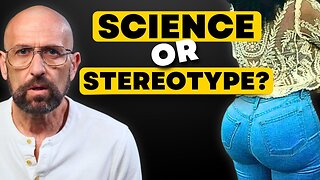Premium Only Content

The Incomplete Science of Cancer Biology | Thomas Seyfried
Short Summary: Cancer’s metabolic roots with Dr. Thomas Seyfried.
About the guest: Thomas Seyfried, PhD is a professor of biology at Boston College. He has researched cancer metabolism, epilepsy, and lipid biochemistry for over 40 years.
Episode Summary: Dr. Thomas Seyfried discusses the mitochondrial metabolic theory of cancer, challenging the dominant somatic mutation theory. He explores how cancer cells rely on fermentation due to defective oxidative phosphorylation, drawing on Otto Warburg’s work. Seyfried explains how ketogenic diets and nutritional ketosis can starve cancer cells by limiting glucose and glutamine, while sharing evidence from nuclear transfer experiments and clinical studies. The conversation also covers environmental factors driving cancer and the importance of metabolic flexibility for prevention.
Key Takeaways:
Cancer is characterized by dysregulated cell growth, but Seyfried argues it stems from mitochondrial dysfunction, not just genetic mutations.
Cancer cells ferment glucose & glutamine, unable to use fatty acids or ketones, making ketogenic diets a potential therapeutic tool.
Nuclear transfer experiments show cancer traits reside in the cytoplasm, not the nucleus, challenging the somatic mutation theory.
Environmental factors like processed foods, stress, and poor sleep disrupt mitochondrial function, increasing cancer risk.
Seyfried’s glucose-ketone index helps monitor metabolic states to manage cancer & chronic diseases.
Cancer rates are rising in younger people, possibly due to obesity, inflammation, and environmental toxins.
Metabolic flexibility, cycling between ketosis and carb-based states, may mimic ancestral patterns and reduce chronic disease risk.
*Not medical advice.
-
 1:58
1:58
Alice Springs To Mind
2 days agoAustralia's Digital Identity System Explained
61 -
 9:33
9:33
Ken LaCorte: Elephants in Rooms
13 hours ago $3.17 earnedWhy Do Black Men Love Big Butts?
27.1K17 -
 2:12
2:12
From Zero → Viral with AI
1 day ago $6.44 earned🚀 AI Marketing Isn’t Just for Big Brands Anymore — Here’s Why
42.2K10 -
 9:51:58
9:51:58
Dr Disrespect
17 hours ago🔴LIVE - DR DISRESPECT - 10 WINS ON CONTROLLER - BO7 TOMORROW
311K20 -
 1:24:56
1:24:56
Glenn Greenwald
10 hours agoTrump Declares Cities as the Enemies Within; Reagan Appointed Judge Slams Trump Over Speech Crackdowns; American ER Doctor on Gaza Atrocities | SYSTEM UPDATE #524
142K96 -
 4:07:42
4:07:42
I_Came_With_Fire_Podcast
16 hours agoPete Hegseth and the Chamber of Standards | Digital IDs | Taiwan Chips & Salsa | CDL Crisis
37.9K2 -
 2:01:46
2:01:46
Adam Does Movies
16 hours ago $0.64 earnedTalking Movies + Ask Me Anything - LIVE
23.1K -
 29:11
29:11
Nick Shirley
8 hours ago $5.54 earnedPortland has Fallen... ANTIFA Take Control of City
23.5K45 -
 1:19:00
1:19:00
VapinGamers
8 hours ago $2.00 earnedJump Space - We All Scream in Space - Early Access - !rumbot !music
20.7K2 -
 1:50:12
1:50:12
Joker Effect
7 hours ago(Kick) Streamers Have Ruined The Streaming Landscape and Here is How! Reviewing Phase Partners...
26.6K1